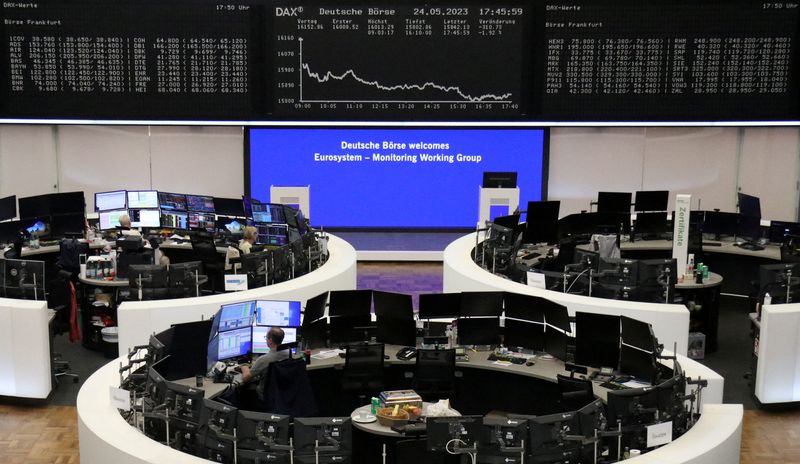Investing.com’s stocks of the week
By Sruthi Shankar and Ankika Biswas
(Reuters) - European shares edged lower in light trade on Monday, on losses in technology and bank stocks, while investors assessed the tentative deal reached by U.S. lawmakers to raise the nation's debt ceiling and avert a default.
The pan-European STOXX 600 index closed 0.1% lower, after logging its strongest one-day gain in nearly two months on Friday.
Markets in the United States, the UK and several European countries were closed on Monday.
U.S. President Joe Biden on Sunday finalised a budget agreement with House Speaker Kevin McCarthy to suspend the $31.4 trillion debt ceiling until Jan. 1, 2025, and said the deal was ready to move to Congress for a vote.
"There's some optimism of reaching agreement on the debt ceiling," said Susannah Streeter, head of money and markets at Hargreaves Lansdown.
"But focus has returned to what's going to happen given inflation is still stubborn, worries about a hard landing in the U.S., and the impact of the European Central Bank's expected rate hikes on euro zone economies."
Analysts also pointed out that the deal still has to pass votes in the House perhaps on Wednesday, and then the Senate. However, a clearer reaction will kick in when U.S. and UK markets reopen.
After rallying to multi-year highs on the back of an upbeat earnings season earlier in May, concerns about debt ceiling standoff and signs of global economic slowdown have pressured European stocks of late. The benchmark STOXX 600 is on track to log its steepest monthly drop this year.
Shares of SBB advanced 2.6% from record lows as the struggling Swedish real estate group is broadening a strategic review to include a potential sale of the whole company or some of its business segments. Fitch on Friday cut its credit rating to so-called junk status, citing insufficient deleveraging.
Spain's IBEX slipped 0.1% after Socialist Prime Minister Pedro Sanchez unexpectedly called a snap national election and his main rival spelled out the aim of becoming the country's next leader, after left-wing parties were routed in a regional ballot.
Meanwhile, French Economy Minister Bruno Le Maire is in "very close discussions" with credit ratings agency Standard and Poor's (NYSE:SPY), which put France on notice in January for a possible downgrade, Prime Minister Elisabeth Borne noted.
France's CAC 40 was down 0.2%.
Elsewhere, Turkish President Tayyip Erdogan extended his two decades in power in elections on Sunday, winning a mandate to pursue increasingly authoritarian policies, which have polarised the country and strengthened its position as a regional military power.
Spain's BBVA (BME:BBVA), among the European companies most exposed to Turkey, slipped 1.2%, while Paris-listed Lyxor MSCI Turkey ETF added 1.8%.
